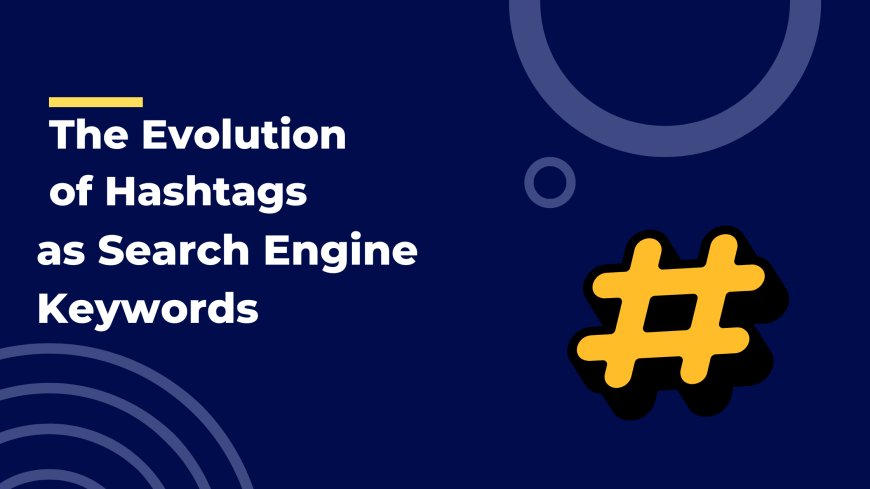The Evolution of Hashtags as Search Engine Keywords

Introduction
Hashtags have traveled far from their humble origins. Originally designed to label content on Twitter, hashtags are now tools for digital discovery, branding, and search engine optimization (SEO). Their evolution from metadata tags to mainstream search engine keywords mirrors the dynamic nature of online behavior and content marketing. As SEO practices evolve, hashtags now significantly contribute to the way information is discovered and indexed throughout the web.
1. The Hashtag's Birth
The hashtag debuted on Twitter in 2007, courtesy of Chris Messina, a social technology specialist. He suggested using the pound sign (#) to categorize similar tweets. Although initially received with skepticism, hashtags soon became popular as users understood their potential for content organization.
Hashtags started shaping global discourse. Campaigns such as #BlackLivesMatter, #MeToo, and weekly hashtags like #ThrowbackThursday showcased their significance in activism and entertainment. With time, hashtags transcended social labels—they became indicators of cultural moments.
During the initial years, hashtags were primarily confined to social media buzz. But as brands and influencers adopted them, their potential as a marketing and search tool started to unravel.
2. Hashtags vs Keyword
Both hashtags and keyword-based searches help associate users with information, but each has a distinct structure and function. A hashtag usually begins with a # symbol and does not contain spaces, whereas a keyword is an everyday phrase utilized within search engines.
Search engines used to overlook hashtags, but as usage patterns changed, they started indexing them for relevance. Today, Google and social media platforms both include hashtags in their algorithms. When users look up #FitnessTips, for instance, they're directed to content labeled as such across social media and even occasionally blog pages.
Additionally, the emergence of voice and mobile search caused a change in user patterns. Individuals are more likely to search based on short phrases or even hashtags instead of full queries—particularly when navigating sites such as Twitter, Instagram, or TikTok.
3. The Emergence of Hashtag SEO
Professional online marketers soon noticed the potential for hashtags to augment reach and awareness. By meaningfully inserting hashtags into copy, brands were able to participate in trending topics, boost engagement, and show up in search-related results.
These included platforms like Instagram, TikTok, and LinkedIn. Instagram's discovery tab is highly powered by hashtag algorithms, and TikTok trends flourish with hashtag challenges and campaigns. Even business networks like LinkedIn push industry-related hashtags for content discovery.
Therefore, marketers started performing hashtag research like keyword research—selecting high-performing tags, analyzing competition, and balancing reach and specificity.
4. Hashtags and Modern Search Engines
Today's search engines are much advanced. Google, for example, shows hashtag-related search results directly on the SERP (Search Engine Results Page). Searching with a term such as #DigitalMarketing brings back tweets, posts, and even blog posts having the hashtag.
On YouTube, hashtags show up over video titles and are clickable. Pinterest employs hashtags to recommend related pins, boosting its in-house search algorithm. As the nature of search transitions toward being more visual and contextual, hashtags provide instant categorization and context.
Even voice assistants and AI-powered search tools are starting to comprehend and respond to hashtag-based queries. This unlocks new SEO frontiers where brief, hashtag-like phrases become part of intelligent content targeting.
5. Strategic Hashtag Usage for SEO
To utilize hashtag SEO to its best extent, businesses and creators need to be strategic. Here's how:
Hashtag Research: Leverage Hashtagify, RiteTag, or social platform analytics to identify popular and relevant hashtags within your industry.
Performance Tracking: Track how hashtags perform over time—monitor impressions, clicks, and conversions associated with given tags.
Diverse Tag Strategy: Mix trending, branded, and niche-specific hashtags to reach various levels of audience engagement.
For instance, a fitness brand could utilize #HomeWorkout (trending), #FitWithXYZ (branded), and #ResistanceBandExercises (niche-specific) for maximum reach and relevance.
6. From Social Posts to File Management: Leveraging Keyword Potential
The idea of keywords—hashtags included—is not limited to social networks. It now extends to file names, metadata, and document management. Incorporating effective keywords into document names and metadata can enhance their visibility on search engines.
Suppose you're converting a social campaign to a downloadable PDF. To get that document search engine-optimized, it's important to inject keywords into the title and metadata. And if you need to edit it, you can always edit PDF with the kind of tools used for content optimization. That way, your documents aren't just readable—but searchable and relevant to search engines too.
Whether it's web pages, videos, or downloadable files, using keyword logic—similar to hashtags—increases your content's visibility on all digital fronts.
7. The Future of Hashtags in Search
As the semantic web and AI advance, the future of hashtag use in search is bright. Machine learning will analyze hashtag trends more and more in real time, providing smarter suggestions to users and creators alike.
We can expect voice assistants to recognize and react to hashtag-style phrases (e.g., "Search #HealthyRecipes"). User behavior- and hashtag-driven search results will grow more precise and relevant.
Eventually, hashtags might serve as a bridge between structured data and human intent—placing them among the most effective tools in digital marketing and search engine strategy.
Explore the Posts
Conclusion
Hashtags have developed from being basic social tools to being mighty digital keywords. Their transformation from labeling conversations on Twitter to determining search engine rankings is a reflection of the ever-changing nature of online behavior.
Nowadays, hashtags assist brands, marketers, and regular users in gaining visibility, generating engagement, and reaching the right audiences. By knowing how they work, maximizing their application, and keeping up with online trends, anyone can unlock the complete power of hashtags in SEO.
In the future, adopting hashtag-based search strategies will be crucial for those who want to remain relevant in a more competitive digital world.

 lucassjack
lucassjack 

